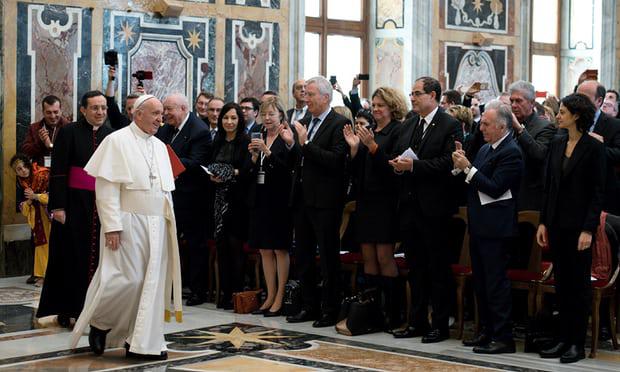|
OPINION: Five years on, Pope Francis has failed to deliver on his promises
By Catherine Pepinster
The pontiff’s efforts at church reform have stalled, letting down liberal Catholics on issues such as child abuse and the role of women If there is something the Roman Catholic church does supremely well, it is the spectacle of an election. From the cardinals in the Sistine Chapel voting and the white plumes announcing the election of a new pope, to the new man stepping onto the balcony of St Peter’s to greet the crowds, it is one moment of high drama after another. Now such a huge global figure, it is hard to believe that when Cardinal Jorge Bergoglio of Buenos Aires first greeted the crowds on 13 March 2013, and announced he would be called Pope Francis, most of the world – including Catholics – asked, “Who’s this?” As Francis quipped on the day, the cardinals went to the ends of the earth to find a new pope. They made their decision based partly on the troubles the Catholic church faced, troubles that had so overwhelmed Benedict XVI that he had resigned. These troubles included the decline in Catholic numbers in the west, the mess of the church’s finances and evidence of money-laundering and corruption, the Vatican’s bureaucracy, the child sexual abuse scandals and the fading influence of Catholic sexual morality in the face of more secular influence. And just as Francis had pleased the cardinals, he quickly won over the world. His modest lifestyle, his ready engagement with ordinary people, his desire for reform of the church’s structures and more compassionate attitudes to divorced, remarried and gay people, made him hugely popular. At the Vatican, he quickly took action, setting up a group of progressive cardinals to investigate how to reform it. Five years on, Francis’s efforts at reforms have got stuck. The pope recognises the problems of overhauling the unwieldy structure of the Vatican bureaucracy: he has likened it to cleaning the Egyptian sphinx with a toothbrush. Then there is his calling of synods to discuss the family, especially the treatment of divorced and remarried Catholics. They have won him huge support among millions of people in the pews, but have led to open hostility from conservative prelates. Two issues above all remain a problem for him: child abuse and the role of women. Francis’s creation of a special commission to examine the global problem of children being abused by priests was considered a breakthrough. Four years down the line, and with the two abuse victims who were members having resigned, it seems no nearer to producing new ways of dealing with the issue. And despite Francis’s own zero-tolerance comments about abuse, there have been occasions when he has seemed unwilling to take action against those involved. That Francis included women on the abuse commission was a welcome sign of change. So was his setting up of a commission to look at women deacons in the church, though two years on it has not reported. But there is an impatience among Catholic women about the extent to which the church is still dominated by a celibate male priesthood. The language used by the former Irish president Mary McAleese, when she denounced the church last week as an “empire of misogyny”, might have been extreme but it did articulate the frustrations of so many women that not only are they ignored, but also their talents are going to waste. One of the pope’s closest aides, the Honduran cardinal Óscar Rodríguez Maradiaga, has said: “The church does not have a reverse gear, it can only go forward.” There are certain changes that Francis has made. There is a new tone, focused on mercy and understanding, rather than rigid roles and condemnation of people. This is typified by his “Who am I to judge?” comment about gay people. He emphasises the church serving others and working with other Christian churches. He highlights the plight of the marginalised. He is a charismatic public figure, a successful one-man PR campaign for Christian values. But while the church may not have a reverse gear, its progress is at snail’s pace. Two things above all are impeding its progress. The Vatican’s career bureaucrats are one. If Francis is to enact further change, he has to rethink their hold on power. The simplest way to deal with it would be to limit how many years they can serve in Rome to 10, or even five. He could also open up Vatican posts to lay people, men and women. The other big issue that needs to be addressed is the role of pope itself. Being a roving global peacemaker, managing a church of 1.2 billion people, trying to reform Rome, writing theological documents and being a spiritual guide – it’s hard to see how one human being can do all this, especially at the age of 80. When the cardinals went to the ends of the earth to find Francis, they handed him a mission impossible. His greatest legacy, as he contemplates the next five years, would be to rethink the role of the pope itself.
|
.
Any original material on these pages is copyright © BishopAccountability.org 2004. Reproduce freely with attribution.
